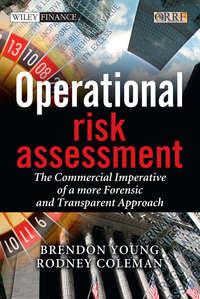Operational Risk Assessment. The Commercial Imperative of a more Forensic and Transparent Approach

Young Brendon and Coleman Rodney
Genre:financial management
Language:English
Type:PDF book
Publisher:John Wiley & Sons Limited
Publication date:08.12.2022
Price:$175.74
Views:62
Operational risk assessment The Commercial Imperative of a More Forensic and Transparent Approach Brendon Young and Rodney Coleman “Brendon Young and Rodney Colemans book is extremely timely. There has never been a greater need for the financial industry to reassess the way it looks at risk. […] They are right to draw attention to the current widespread practices of risk management, which […] have allowed risk to become underpriced across the entire industry.” Rt Hon John McFall MP, Chairman, House of Commons Treasury Committee Failure of the financial services sector to properly understand risk was clearly demonstrated by the recent credit crunch. In its 2008 Global Stability Report, the IMF sharply criticised banks and other financial institutions for the failure of risk management systems, resulting in excessive risk-taking. Financial sector supervision and regulation was also criticised for lagging behind shifts in business models and rapid innovation. This book provides investors with a sound understanding of the approaches used to assess the standing of firms and determine their true potential (identifying probable losers and potential longer-term winners). It advocates a more forensic approach towards operational risk management and promotes transparency, which is seen as a facilitator of competition and efficiency as well as being a barrier to fraud, corruption and financial crime. Risk assessment is an integral part of informed decision making, influencing strategic positioning and direction. It is fundamental to a company’s performance and a key differentiator between competing management teams. Increasing complexity is resulting in the need for more dynamic, responsive approaches to the assessment and management of risk. Not all risks can be quantified; however, it remains incumbent upon management to determine the impact of possible risk-events on financial statements and to indicate the level of variation in projected figures. To begin, the book looks at traditional methods of risk assessment and shows how these have developed into the approaches currently being used. It then goes on to consider the more advanced forensic techniques being developed, which will undoubtedly increase understanding. The authors identify best practice and address issues such as the importance of corporate governance, culture and ethics. Insurance as a mitigant for operational risk is also considered. Quantitative and qualitative risk assessment methodologies covered include: Loss-data analysis; extreme value theory; causal analysis including Bayesian Belief Networks; control risk self-assessment and key indicators; scenario analysis; and dynamic financial analysis. Views of industry insiders, from organisations such as Standard & Poors, Fitch, Hermes, USS, UN-PRI, Deutsche Bank, and Alchemy Partners, are presented together with those from experts at the FSA, the International Accounting Standards Board (IASB), and the Financial Reporting Council. In addit